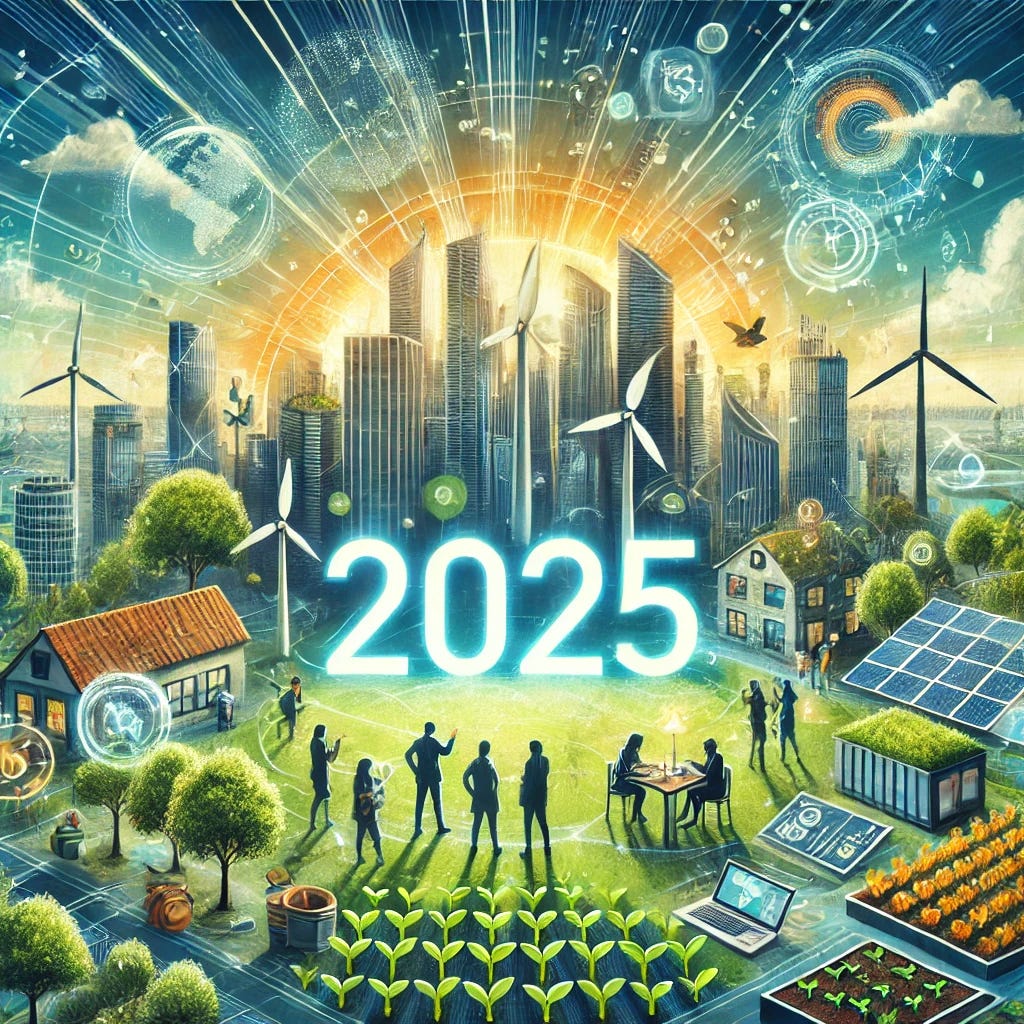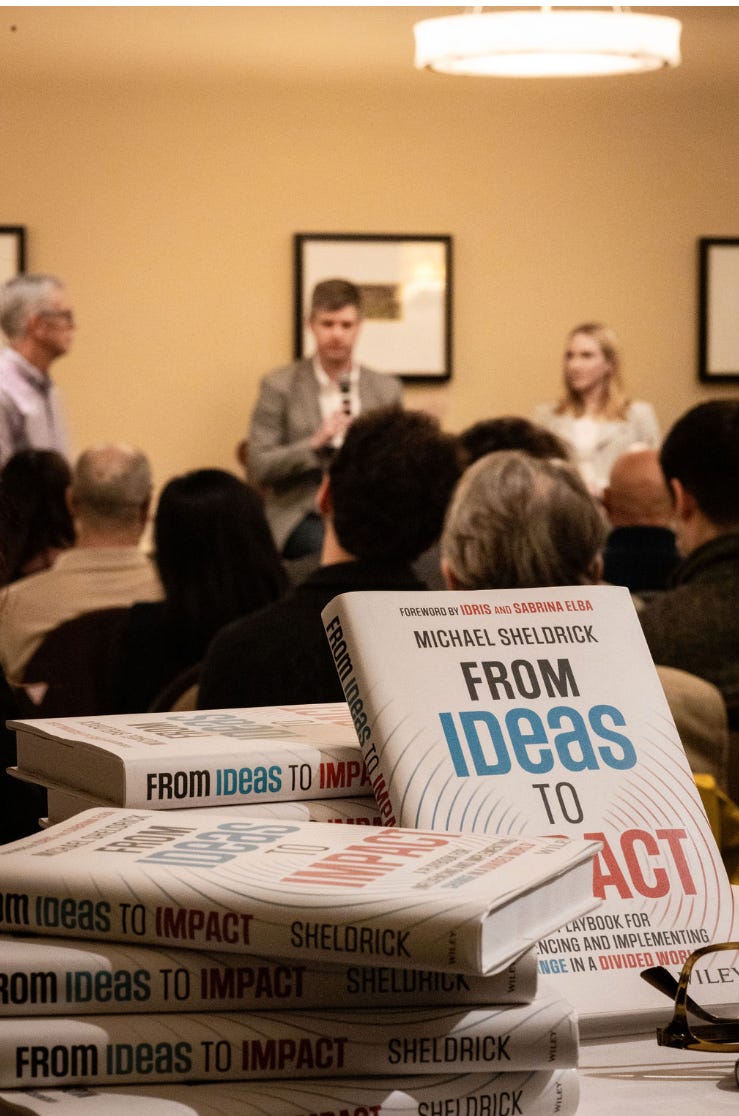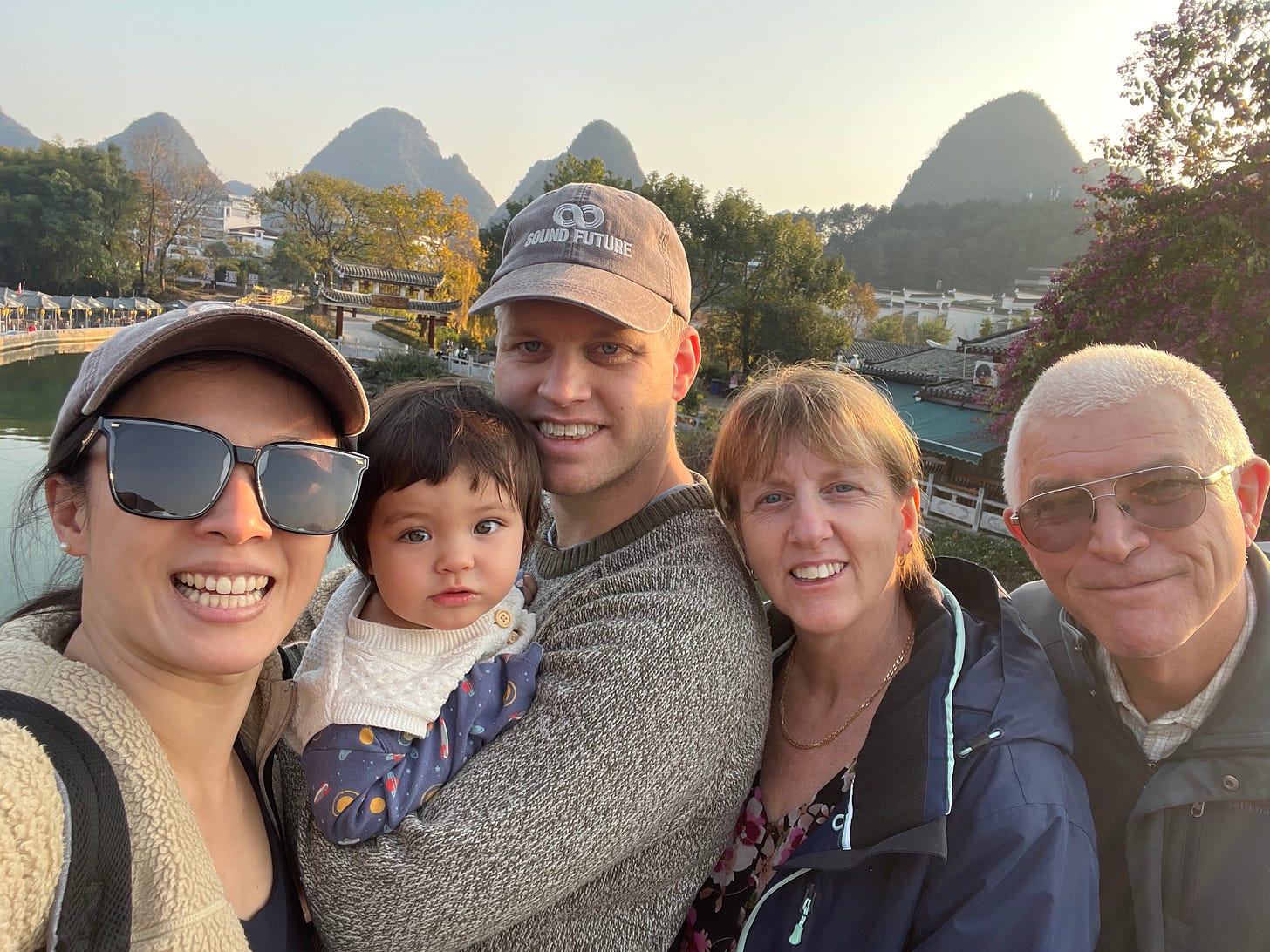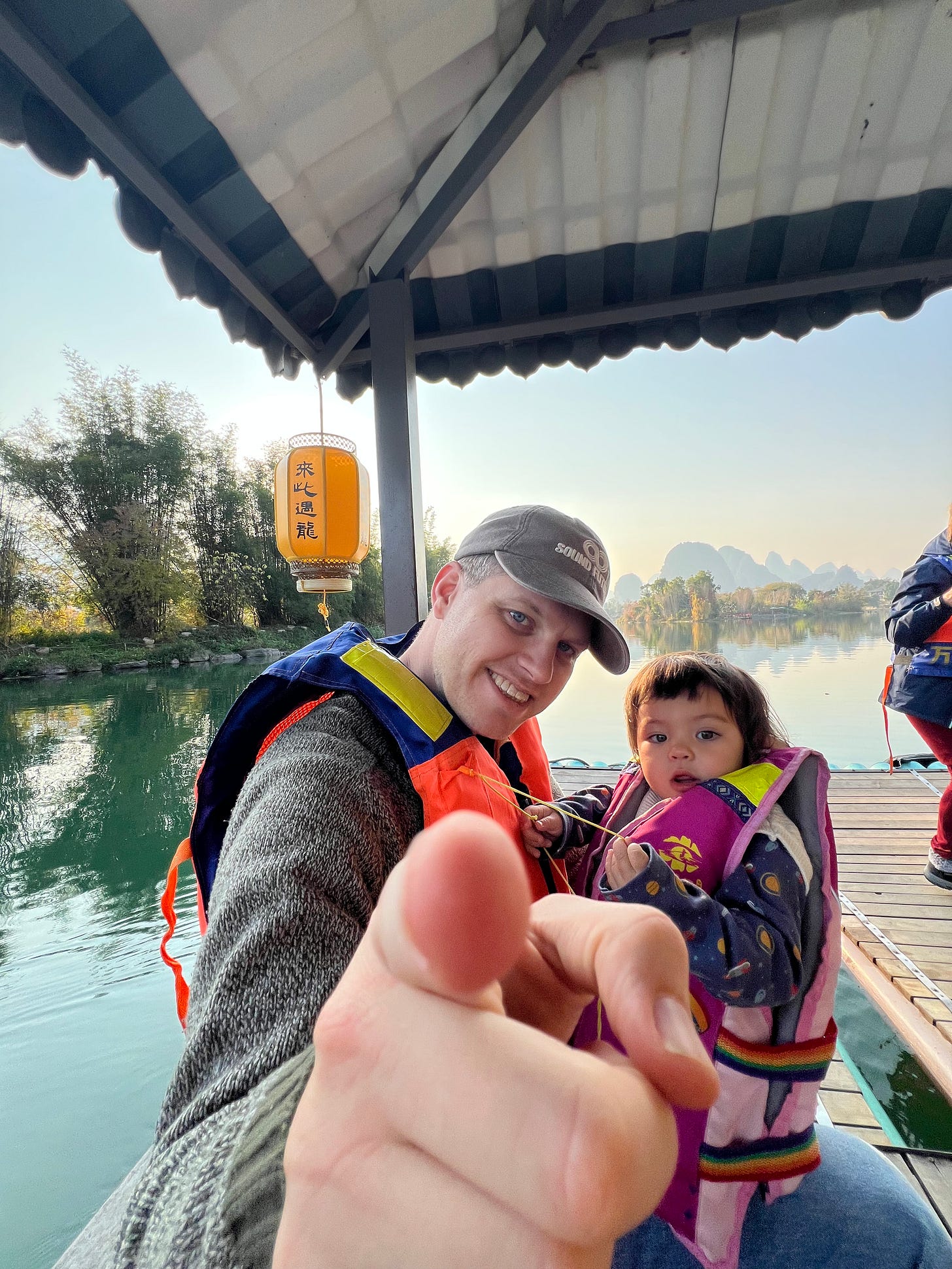Reflections, Gratitude, and Big Ambitions for 2025
A look back at 2024 milestones, lessons from a debut book tour, and the challenges and hopes shaping 2025.

Dear Friends and Supporters,
Happy New Year!
As we enter 2025, thank you for your amazing support and encouragement. This community has been a constant source of inspiration, often in more profound ways than you might imagine.
In this first newsletter of the year, I’m excited to share a recap of personal and professional highlights, some reflections from the book tour, and a glimpse of what’s ahead!
1) Book Launch Success
In 2024, I celebrated the debut of my first book (and hopefully not my last!). It hit #1 in several Amazon categories and launched in paperback in South Africa (signed copies are still available here).
This book is, at its heart, about inspiring more acts of good—plain and simple. In 2024, I worked to bring this mission to life through more than 100 events (at least, the ones we counted!). These ranged from podcasts, talks, and webinars to book readings in diverse settings—like a session at the UN bookstore, fireside chats with Alec Baldwin and the Duchess of York, a cozy evening at a Colorado pub with pizza (featuring an opening by The Lumineers’ Wesley Schultz), a visit to a meadery, and stops at universities, Rotary clubs, workplaces, and bookstores across the globe.
When I started writing, I thought the most demanding challenge would be finishing the manuscript. And to be fair, racing to complete the first draft in 2023—submitting it just eight days before our daughter Miki was born—was no small feat. But I quickly realized - as many first-time authors inevitably do - that the most significant hurdle would be marketing the book, which required immense effort, creativity, and, above all, the support of incredible networks (and seriously committed friends!).
To everyone who cheered us on—whether by leaving a review, inviting me on your podcast, hosting an event, or even welcoming me and my family into your home—we can’t thank you enough. A big thanks also goes to Foundation Source, whose contributions ensured book sale proceeds often went to charity. Finally, a book would be nothing without its readership, so THANK YOU to everyone who picked up a copy of my book and passed it along to others!
On that note, if you haven’t yet left a review, I’d love to hear your thoughts. Reviews play a critical role in a book’s success, and I’d greatly appreciate it if you shared yours on Goodreads or Amazon. Further down, you can also read some insights I gleaned from the road while on (the still ongoing!) book tour.
2) Global Citizen’s Record-Breaking Impact
You can find a comprehensive rundown here of all of GC’s impact in 2024. A standout highlight was the Global Citizen Festival campaign, in which global citizens took a record-breaking 4.3 million actions. GC also honored inspiring changemakers through its prizes and awards programs, as well as recognized 32 youth leaders. Ready for a challenge in 2025? You can explore these opportunities to join the Global Citizen team and drive impact here.
3) Serving on Boards
In 2024, I had the privilege of serving on the boards and advisory boards of several impactful organizations, including the Fossil Fuel Non-Proliferation Treaty, the Ban Ki-Moon Centre for Global Citizens, Benjamin Franklin House, the Nigeria Support Solidarity Fund, and the Elba Hope Foundation. I am constantly inspired by the dedication and resilience of their small, hardworking teams, which push forward with limited resources to achieve their missions. I encourage you to check them out.
4) A Year of Family and Personal Growth
2024 was a year of personal growth, and for me, it marked my first full year as a father. Just over a year ago, Miki came into our lives, and as I write this, we're navigating traffic in China with her happily tucked in her car seat beside me. It’s safe to say that the concept of "work-life balance" has taken on a whole new meaning.
Suffice it also to say that simultaneously launching a book, juggling intense campaigns, and being a first-time parent was a serious challenge! We turned the book tour into a family adventure wherever the opportunity arose, bringing Miki along as we traveled from Barbados to Australia, the Rockies, and South Africa. While Miki might not remember these trips, Xinyi and I certainly will.
What I learned Amidst Upheaval
Of course, throughout 2024, the scale of our global challenges was impossible to overlook. Wars dragged on, political turbulence rattled democracies, and climate disasters set grim new records. I’ve written about how my New York book launch took place against a backdrop of hope and upheaval—quite literally, as protests erupted just meters away.
Yet, amidst the prevailing doom and gloom, I found countless reasons for hope. The resilience and dedication of those I met this year—frontline climate advocates, community leaders bridging divides, and many others—left an indelible mark on me. What follows is a glimpse into the lessons I’ve gathered throughout the year.
A) Bridging Differences is Desirable, Possible, and Essential
People yearn for connection, understanding, and healing, according to new studies from the nonprofit org More in Common. Perhaps unsurprisingly then, during my talks, the stories from Chapter 2 (“The Diplomat”) of my book seemed to resonate deeply with audiences. One example is my recent TEDx Talk (now approaching 50,000 views!), in which I shared how progress often requires working with people we may not always agree with or even like—a message that struck a powerful chord based on feedback. People seemed particularly moved by the stories I shared.
That said, less I am misconstrued, being a good diplomat or coalition builder doesn’t mean engaging with absolutely everyone. As climate communicator and Saving Us author Katharine Hayhoe notes, roughly 10% of people on any given issue may never change their views—and that’s okay. The focus should rather be on consensus-building with the other 90% of the populace. But whether it’s changing a city bylaw, passing federal legislation, or getting a business to adopt a new practice, achieving change requires the support of people who may not align with us 100% on every issue.
A story shared by the climate venture capitalist Tom Chi at one of my most recent book events illustrated this beautifully. Tom shared an anecdote about recently touring a massive Texas wind farm with its owner. He was impressed. At the end of the visit, however, the owner remarked to him, “I don’t know about all this climate change nonsense, though.” As I said, driving change often means forging coalitions with people who don’t always think, talk or act like us. Also, as philosopher JS Mill once said, “When one’s ideas are not challenged, one’s ability to defend them weakens.” Engaging with people outside our groups and tribes ultimately helps strengthens our ideas and makes us better at communicating them - and, in turn, building support for them.
B) The Power of Policy Entrepreneurship
It might surprise some of you to learn that I almost left out the concept of "policy entrepreneurship" from my book because my editor at one point didn’t seem too keen on it, but I’m glad I didn’t. Time and again, I heard how it resonated with people.
As an author, there is perhaps nothing more fulfilling than having someone approach you after a talk to say, “That point really resonated with me,” or to share their own experience, ideas, and perspectives in validation of your argument.
While surveys consistently show growing pessimism worldwide, especially among young people, that our actions can’t make a difference, I encountered multiple examples from all walks of life to the contrary, of policy entrepreneurship in action—a young Caribbean advocate tackling AI-driven bullying, Rotarians championing the eradication of a resilient and dangerous diseases, denim manufacturers aiming to cut their industry’s environmental impact, musicians building communities in support of changing their industry (often one pub show at a time!), and countless more.
Each of these individuals and organizations exemplified some, if not all of the 8 principles I discuss in the book. Each had a clear goal and awareness of their strengths. Each had a story—a tangible, lived example of change in action. Ultimately, each one reminded me of Eleanor Roosevelt’s words that change often begins:
“In small places, close to home – so close and so small that they cannot be seen on any maps of the world. Yet they are the world of the individual person; the neighborhood he lives in; the school or college he attends; the factory, farm, or office where he works.”
C) It’s Never Too Late to Make an Impact
As many obituaries published in recent days about the life of the late former US President Jimmy Carter have reflected on, change can be a lifelong journey. Many of the people I met were quite often in their second or third acts of life. Indeed, Carter’s post-presidency work has left a mark that’s arguably more profound than his time in office.
D) People Are (On The Whole) Instinctively Drawn to Cooperation
As a co-founder of an organization called Global Citizen, I’m often asked whether I’m worried about the state of cooperation at the global level. It’s true that national and global collaboration faces significant challenges, as outlined in the latest Global Solidarity Report. Yet, the same report offers hope: the majority of people worldwide still believe cooperation is the key to solving our biggest challenges—a sentiment echoed repeatedly during my book tour.
While “community” may not appear explicitly in my book, readers often note it came through strongly as an underlying theme. That’s no surprise—at its core, good policy is about improving lives, and community and collaboration are often the tools to make policy work better for people. A prime example, that I write about in the book, is Collie, Western Australia, where a just transition from coal demonstrates the power of community-led solutions.
E) Challenges Remain But Are Surmountable
Throughout 2024, I continued to observe several of the hurdles that I list in From Ideas to Impact as having the potential to derail efforts to do good. One persistent challenge is the disproportionate focus some still place on scrutinizing whether individuals or organizations have shared the "correct" messages on social media, rather than channeling that energy instead into analyzing problems, crafting impactful solutions, and nurturing the level of support needed to actually implement them. The tendency to subject ideas and organizations to “purity tests” isn’t new—periods like McCarthyism in the 1950s, when many artists and entertainers were ostracized over alleged communist ties, remind us of the dangers of communal hysteria—but social media has amplified this behavior, fueling endless cycles of unproductive tribalism.
At best, this tendency can distract from meaningful action. Worst case, it proves counterproductive (several examples of which I outline at the start of my book). Encouragingly, though, I also noticed a shift in 2024—a growing emphasis for organizations to push back against this trend. More discussions are now starting with the question: How can we - with the resources and networks at our fingertips - best maximize positive outcomes for people and the planet? I hope this continues into 2025.
Another theme that gained attention was the well reported growing gender divide among young men and women, regarding political values. This issue often sparked heated debate during events I attended.
During one panel, for instance, one speaker pointed to this divide and argued that men were and are mostly to blame for the climate crisis. Another speaker noted that the existence of the divide itself was yet another instance of men making the conversation about themselves. While I understood these perspectives—historically, men have dominated leadership roles, particularly during the industrial revolution, a significant driver of today’s climate challenges—dismissing or overlooking this new trend also risks being counterproductive.
In the end, men comprise roughly half of every society, and the support of many of them will be essential for building the consensus needed to drive necessary policy changes. Sustaining ambitious and durable progress on any issue—whether on climate or equality—requires the active participation and support of a broad spectrum of society. Writing off or condemning an entire group risks alienating further those whose involvement may be critical. I for one, however, certainly don’t claim to have all the answers, and I welcome thoughts and ideas. I’ve also been reading Richard Reeves’s Of Boys and Men, which has been recommended to me on several occasions.
Looking Ahead To 2025
On the book tour front, given the sustained level of interest, our plan is to keep it going throughout 2025—enough to reach another printing. Many of you have asked about a follow-up book, and the best way to make that happen is by ensuring this one’s continued success. Reviews and sales matter, and your support means the world. In the meantime, I’ll keep writing and sharing fresh insights - and, by popular demand, more stories - wherever I can.
If you know of someone making a difference, big or small, send them my way. I’m constantly on the lookout for more inspiring stories to share about policy entrepreneurs, past and present. On that note, I’ve almost finished an additional bonus chapter, introducing a new leadership approach to policy entrepreneurship, that I hope to share soon. If you’d like a copy of the bonus chapter, it will be shared first with those who ordered the book. Just send your receipt to michael@michaelsheldrick.com. And if affordability has been a barrier to getting a copy of the book to begin with, please don’t hesitate to reach out.
On the Global Citizen front, three big campaigns are lined up:
Mobilizing $1 Billion to Protect the Amazon: This campaign will culminate in November with a milestone event—a Global Citizen Festival, on the edge of the Amazon, coinciding with Brazil’s hosting of the UN’s COP30 climate negotiations.
Scaling Up Renewables In Africa: In collaboration with South Africa and the European Union, we’re driving commitments to triple renewable energy capacity by 2030.
Securing Funding To Save 8 Million Lives: This aim is to secure $9 billion in investments for Gavi, the Vaccine Alliance, to immunize 500 million children by 2030—helping to save 8 million lives.
Lastly, for some weekend reading, take a look at my latest piece, “7 Big Ideas That Could Shape 2025.” Plus, check out my top 10 book and podcast recommendations!
Mick









